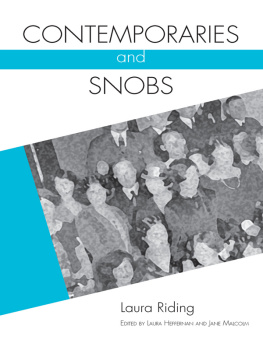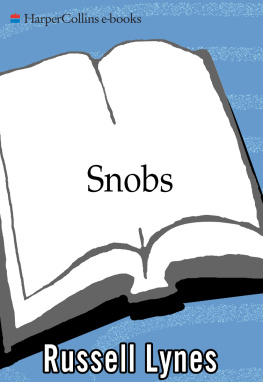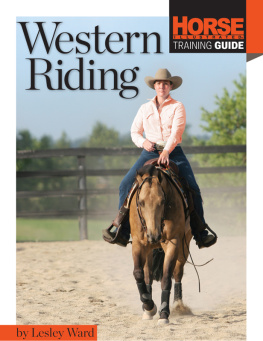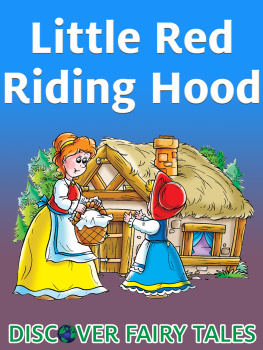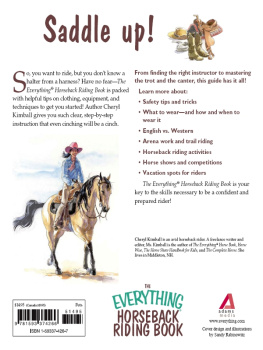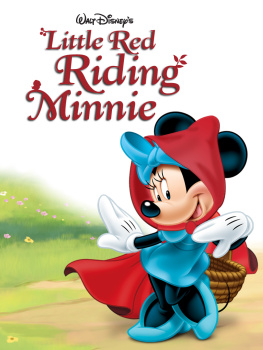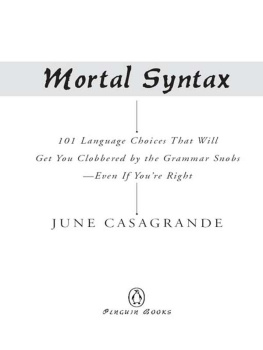Riding - Contemporaries and Snobs
Here you can read online Riding - Contemporaries and Snobs full text of the book (entire story) in english for free. Download pdf and epub, get meaning, cover and reviews about this ebook. publisher: University of Alabama Press, genre: Art. Description of the work, (preface) as well as reviews are available. Best literature library LitArk.com created for fans of good reading and offers a wide selection of genres:
Romance novel
Science fiction
Adventure
Detective
Science
History
Home and family
Prose
Art
Politics
Computer
Non-fiction
Religion
Business
Children
Humor
Choose a favorite category and find really read worthwhile books. Enjoy immersion in the world of imagination, feel the emotions of the characters or learn something new for yourself, make an fascinating discovery.
Contemporaries and Snobs: summary, description and annotation
We offer to read an annotation, description, summary or preface (depends on what the author of the book "Contemporaries and Snobs" wrote himself). If you haven't found the necessary information about the book — write in the comments, we will try to find it.
Contemporaries and Snobs — read online for free the complete book (whole text) full work
Below is the text of the book, divided by pages. System saving the place of the last page read, allows you to conveniently read the book "Contemporaries and Snobs" online for free, without having to search again every time where you left off. Put a bookmark, and you can go to the page where you finished reading at any time.
Font size:
Interval:
Bookmark:

MODERN AND CONTEMPORARY POETICS
Series Editors
Charles Bernstein
Hank Lazer
Series Advisory Board
Maria Damon
Rachel Blau DuPlessis
Alan Golding
Susan Howe
Nathaniel Mackey
Jerome McGann
Harryette Mullen
Aldon Nielsen
Marjorie Perloff
Joan Retallack
Ron Silliman
Jerry Ward
Introduction, supplemental notes, bibliography, and index copyright 2014
The University of Alabama Press
Tuscaloosa, Alabama 35487-0380
All rights reserved
Manufactured in the United States of America
Contemporaries and Snobs Cornell University Library
First published 1928. Restored owned by Division of Rare and Manuscript Collections, Cornell University Library.
Typeface: Minion and Futura
Cover image: Courtesy of Laura Heffernan and Jane Malcolm.
Cover design: Mary Elizabeth Watson
The paper on which this book is printed meets the minimum requirements of American National standard for information sciencespermanence of Paper for Printed Library Materials, ANSI Z39.48-1984.
Library of Congress Cataloging-in-Publication Data
Riding, Laura, 19011991.
Contemporaries and snobs / Laura Riding ; edited by Laura Heffernan and Jane Malcolm.
pages cm. (Modern and contemporary poetics)
Originally published: Garden City, N.Y.: Doubleday Doran, 1928.
Includes bibliographical references and index.
ISBN 978-0-8173-5767-2 (quality paper : alk. paper) ISBN 978-0-8173-8737-2 (e book) 1. Poetry. I. Heffernan, Laura, editor. II. Malcolm, Jane editor. III. Title.
PN1136.J27 2014
808.1dc23
2013030768
We would like to thank the Division of Rare and Manuscript Collections, Carl A. Kroch Library, Cornell University for their assistance. Elizabeth Friedmann's knowledge of Laura Riding's life and letters is vast, and she provided us with crucial insight at key stages of our research. Charles Bernstein and Josephine Park were our earliest readers and supporters. Our thanks also to Jeremy Braddock, Lisa Samuels, and Rachel Buurma for their help along the way.
An Introduction to Contemporaries and Snobs
Laura Heffernan and Jane Malcolm
I was, as a poet, an inveterate propounder of a necessity of non-distinction between person and poet.
Laura (Riding) Jackson, An Autobiographical Summary
Laura Riding's Contemporaries and Snobs, first published in 1928, drew a line down the center of the literary scene in the late 1920s. With characteristic incisiveness, Riding divided friends from foes: she counted as enemies those snobs, or critics, who sought to systematize and professionalize modern poetry. As allies, Riding counted all contemporaries who continued to honor poetry as an individual and eccentric practice. Yet Riding's bold and uncongenial treatise was not merely a call to arms in and of the modernist moment. For readers today, it offers a compelling accountby turns personal, by turns historicalof how the institutionalization of modernism denuded experimental poetry. Most importantly, Contemporaries offers a counter history of the idiosyncratic, of what the institution of modernism left (and leaves) behind. With Gertrude Stein as its figurehead, the book champions the non-canonical, the barbaric, and the under-theorized. Riding's nuanced defense of a poetics of the person in Contemporaries represents a forgotten but essential first attempt to identify and foster what is now a well-defined poetic lineage that leads from Stein to the experimental avant-garde.
Riding began writing Contemporaries in 1926, but the book did not appear until early 1928. The latter half of the 1920s was a prolific period for Riding. Her A Survey of Modernist Poetry, written with Robert Graves, appeared in late 1927, followed by Contemporaries in February of 1928, Anarchism Is Not Enough (the creative sequel to Contemporaries) in May, and A Pamphlet Against Anthologies (also written with Graves) in July. Contemporaries is the most ignored of this varied bunch, perhaps because it responds so directly to the criticism and poetry of its moment. Riding takes her readers on a remarkably thorough tour through the self-critical, severe, sophisticated literary scene of the 1920s (53). Among other influential treatises,she considers T. S. Eliot's The Sacred Wood and his editorial essays in The Criterion, Allen Tate's Poetry and the Absolute, John Crowe Ransom's essays on the modernist poet, Edgell Rickword's essays in The Calendar of Modern Letters, and Herbert Read's posthumous publication of T. E. Hulme's essays.
All of this criticism, Riding notes, gave modern poets a sheen of seriousness and professionalism, but was it good for poetry? Her decisive answer is no. Poets, taking their marching orders from criticism, had begun to churn out deadened, impersonal poetry that gave voice to an imagined zeitgeist rather than individual experience. Contemporaries was Riding's attempt to stem this tideto resist the consolidation of poetic experimentalism into monolithic modernism. Not only a critical diatribe, Contemporaries was also a self-help manual for those poets who wished to write outside the shelter of contemporary criticism (4). To sustain these incorruptible individuals, Riding builds a purely provisional canon of poets as persons, writers who use language to sense the unknown (4). Her perceptive reading of Stein forms the cornerstone of this revaluation of the personal in poetry, and she uses the example of Stein's barbaric writing to question the very process of self-representation that languageStein's arrangement in a system to pointingmakes possible (Tender Buttons 245). At a moment when poet-critics were offering poets a loaded choice between naive expressionism and sophisticated impersonality, Riding denounced both as escapist. As modernism turned self-referentially inward, Contemporaries forged a pathway outward toward newly referential uses of language, toward an unknown and unsanctioned poetry of the person.
From A Survey of Modernist Poetry to Contemporaries and Snobs
Riding was better situated than most to reflect on modernism's condensation. By 1928, she had come into contact with an astonishing number of modernist groups in Nashville, New York, London, and Paris. As an early member of John Crowe Ransom's Fugitive Group in Nashville, she befriended Allen Tate and Robert Penn Warren. Her poetry first appeared in the pages of The Fugitive in 1923 and later in Harriet Monroe's Chicago-based Poetry: A Magazine of Verse. In 1925, Riding moved from Louisville to Greenwich Village where she befriended Hart Crane and met Eugene O'Neill, Edmund Wilson, and Kenneth Burke. While in New York, Riding corresponded with Robert Graves who had written in admiration of her poem The Quids. She soon moved to England to live with Graves and his wife, Nancy Nicholson. Riding and Graves's collaboration (and eventual romantic relationship) continued throughout the 1920s, when they moved between Egypt, Islip, Vienna,Hammersmith, Germany, Paris, and Mallorca. During this time, Riding published creative work with Leonard and Virginia Woolf's Hogarth Press, was introduced to Gertrude Stein, exchanged work with Wyndham Lewis, and contributed essays to Eugene Jolas's Joyce-centric little magazine transition. Of the three essays collected in Contemporaries, two had debuted in other venues. The second chapter and core of the book, T. E. Hulme, the New Barbarism, and Gertrude Stein, was published in
Font size:
Interval:
Bookmark:
Similar books «Contemporaries and Snobs»
Look at similar books to Contemporaries and Snobs. We have selected literature similar in name and meaning in the hope of providing readers with more options to find new, interesting, not yet read works.
Discussion, reviews of the book Contemporaries and Snobs and just readers' own opinions. Leave your comments, write what you think about the work, its meaning or the main characters. Specify what exactly you liked and what you didn't like, and why you think so.

